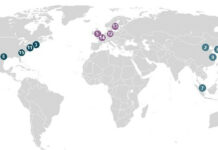By Jenny Vickers
From the September/October 2014 issue
Raleigh and the Research Triangle are global hubs for smart grid and cleantech innovation. The region is home to three tier 1 research universities, a highly skilled and educated workforce, and a diverse array of technology companies which are leading the way in energy and smart grid innovation.
The Research Triangle Park (RTP) located near Durham, Raleigh, and Chapel Hill in the Research Triangle region of North Carolina, is one of the most prominent high-tech R&D centers in the U.S. Located near Durham, Raleigh, and Chapel Hill, RTP is home to over 190 companies employing 50,000 workers and 10,000 contractors, including the second largest IBM operation in the world, GlaxoSmithKline’s largest R&D center, and Cisco Systems’ campus with 4,000 employees, making it the third highest concentration of its employees outside of its Silicon Valley corporate headquarters and India.
The Research Triangle Park will soon be home to a new federal manufacturing innovation institute that is expected to shape the world’s energy future.

In January 2014, President Obama announced the creation of the $140 million Next Generation Power Electronics Manufacturing Innovation Institute, also known as Power America, which will be headquartered at NC State’s Centennial Campus. The Institute will lead a consortium of companies and universities that will develop the next generation of energy efficient power electronic chips and devices.
The Institute will develop new energy solutions through the use and evolution of a technology called wide band gap (WBG) semiconductors.
WBG semiconductors operate at high temperatures, frequencies and voltages, all helping to eliminate up to 90 percent of the power losses in electricity conversion compared to current technology. This in turn means that power electronics can be smaller, more robust, and the technologies that rely on power electronics, like electric vehicle chargers, consumer appliances and inverters that convert electricity from renewable sources like solar farms, will perform better, be more efficient and cost less.
“One of the big advantages of wide band gap semiconductors is that they are much more efficient in terms of energy,” said N.C. State’s Dennis Kekas, the interim executive director of Power America. “Our goal is to build a sustainable model and bring together a complete logistical value chain of what it takes to make power electronics take off.”
The U.S. Department of Energy will provide $70 million to the Institute over the next five years to be matched by business, universities, and the State of North Carolina. This cooperative agreement is the largest in N.C. State’s history.
The consortium, sometimes referred to as a triple helix, is a partnership of universities, federal and state government and industry. It consists of five universities in North Carolina, Virginia, Florida, Arizona and California and companies in 10 states including local companies RF Micro Devices, Cree, GridBridge, and Vacon, a Finnish company with 50 employees in RTP that makes drives that control electric motors. Another company, ABB, is a Swiss energy conglomerate with 150,000 employees worldwide.
According to Kekas, the goal of the institute is to use a consortium approach to scale up U.S. manufacturing.
“Right now, four US manufacturing innovation institutes have been announced, but one day there could be up to 50,” said Kekas. “This network of innovation will help drive sustainability and create a level playing field so that America can be competitive and regain some of the semiconductor and other manufacturing capabilities which have gone offshore.”
The consortium will facilitate fabrication facilities for the next-generation semiconductors and a professional master’s degree program at N.C. State in Wide Band Gap Power Electronics. It will also develop intellectual property and help companies test different manufacturing approaches before they invest in mass production.
So why is the institute taking off now? Kekas says it’s because the time has come.
“It’s a game changer and a lot of people are focusing on it because the world needs it,” said Kekas. “As the world moves towards alternative renewable energies, electric vehicles, and everything from lighting to motor drives and massive data centers used by Google, Apple, or IBM, which consume enormous amounts of energy, power electronics can be embedded there. That’s a lot of savings to be had.”
The Institute will join a host of university and industry resources in the Triangle. The Future Renewable Electric Energy Delivery and Management (FREEDM) Systems Center is an NSF-funded engineering research center focused on developing new technologies associated with the smart grid.
The Center, which is also home to the Advanced Transportation Energy Center (ATEC), counts close to 50 companies as active industry partners. Its solid state transformer was recently named one of the world’s 10 most important emerging technologies by MIT’s Technology Review.
The North Carolina Solar Center, at NC State University, advances a sustainable energy economy by educating, demonstrating clean energy technologies, practices and policies.
Advanced Energy is a nonprofit research institute that collaborates across the industrial, transportation, and renewable energy spectrum to develop and implement sustainable solutions.
The region is also home to the Research Triangle Cleantech Cluster (RTCC), a non-profit economic development organization whose goal is to facilitate collaboration between companies, institutions and government agencies. RTCC is one of only a handful of members of the International Cleantech Network, an international group of regional entities pushing cleantech innovation.
HCL EXPANDS, CREATES 1,237 JOBS
Gov. Pat McCrory and North Carolina Commerce Secretary Sharon Decker recently announced that HCL Technologies Ltd (HCL), a leading global IT services provider will be expanding its presence in Wake County. The company plans to expand its existing center and create an additional 1,237 jobs in Cary by the end of 2018.
As part of its strategy to accelerate innovation and further enhance satisfaction for its clients, HCL sees Cary as a strategic talent hub in the Americas and will invest approximately $9 million in expanding the center. The company continues to invest in its global delivery footprint in order to enhance value for its clients by developing nearshore capabilities.
“HCL has been steadily building its Wake County presence and one reason is the incredible talent pool the Triangle region has to offer IT companies,” Gov. McCrory said. “Providing a well-trained and motivated workforce that meets the real-world needs of employers is evidence of the importance that North Carolina puts on helping employers grow.”
HCL in America is headquartered in Sunnyvale, CA. With more than 8,000 employees in 15 states, HCL’s business in America contributes more than 50% of HCL’s global revenues. HCL already has partnerships with North Carolina New Schools for STEM related initiatives to leverage HCL’s services for content creation and management of its collaborative, online community.
“Given our core philosophy of building Relationships Beyond the Contract (RBtC), we remain committed to enhance our investments by developing nearshore capabilities in the communities we operate in,” said Anant Gupta, CEO, HCL Technologies. “We will continue to bring global expertise and experience to accelerate growth and success for our clients, partners, employees and the communities in the region.”
“North Carolina has worked hard to establish itself as one of the leading states in the IT industry and we are getting results,” said Secretary Decker. “As North Carolina continues to grow its non-traditional industries, we will see more companies choose North Carolina.”
HCL will hire computer professionals to develop, maintain and upgrade software applications and provide services to global clients. Salaries will vary by job function and experience, but the average annual payroll for the new jobs is expected to be nearly $64 million.
“These additional jobs at HCL are going to be an incredible boost to the Cary economy,” said Rep. Nelson Dollar. “The Triangle Region is one of the country’s top IT markets.”
The project was made possible in part by an award to HCL from the state Job Development Investment Grant (JDIG) program, as voted by the state Economic Investment Committee. Receipt of the award is based on proof of job creation and other performance requirements. JDIGs are awarded only to new and expanding businesses and industrial projects whose benefits exceed the costs to the state, and which would not be undertaken in North Carolina without the grant. Under the terms of the company’s JDIG award, HCL is eligible to receive up to twelve annual grants equal to 75 percent of the state personal income tax withholdings from the eligible new jobs created since the date of the initial award. Receipt of each annual grant is based on state-certified proof that the company has fulfilled incremental job creation requirements. Over 12 years, the JDIG award could yield benefits to HCL of more than $19.6 million upon the creation of 1,237 jobs.















![[VIDEO] Get More for Your Business in Ardmore. Oklahoma](https://businessfacilities.com/wp-content/uploads/2024/02/maxresdefault-324x160.jpg)
